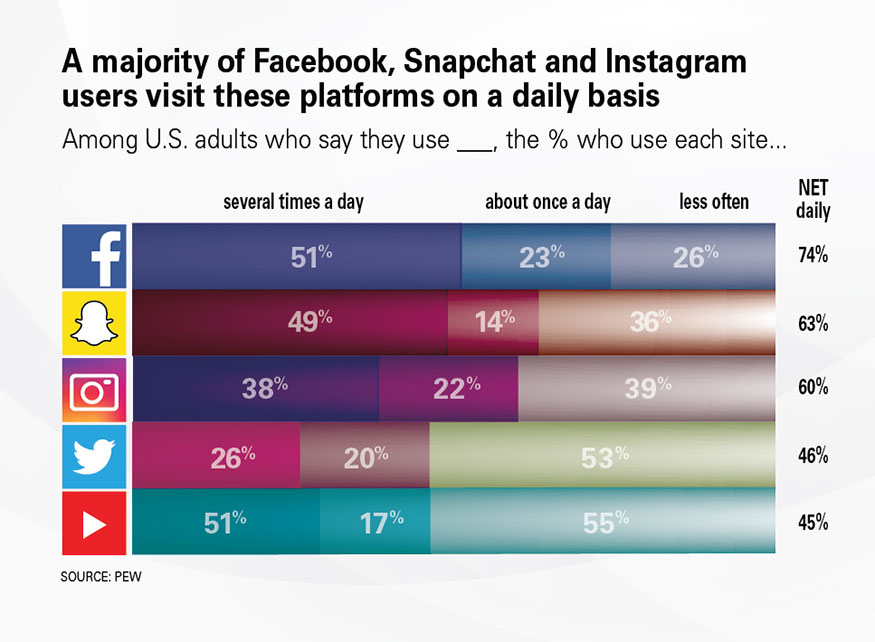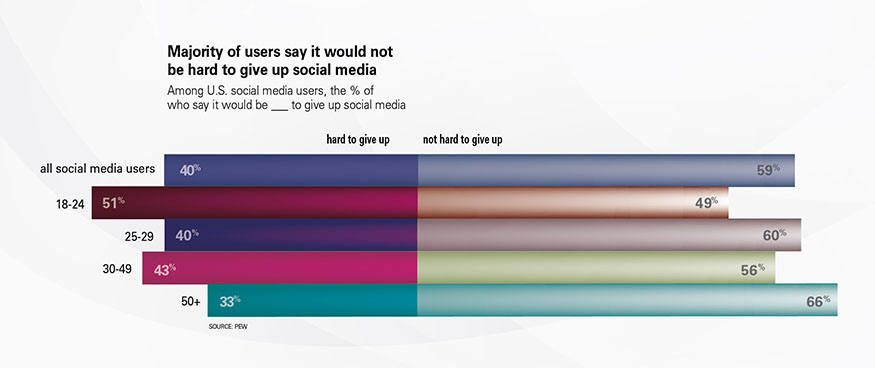A new Pew Research Center survey of U.S. adults finds that the social media landscape in early 2018 is defined by a mix of long-standing trends and newly emerging narratives.
Facebook and YouTube dominate this landscape, as notable majorities of U.S. adults use each of these sites. At the same time, younger Americans (especially those ages 18 to 24) stand out for embracing a variety of platforms and using them frequently. Some 78 percent of 18- to 24-year-olds use Snapchat, and a sizeable majority of these users (71 percent) visit the platform multiple times per day. Similarly, 71 percent of Americans in this age group now use Instagram and close to half are Twitter users.
As has been the case since the Center began surveying about the use of different social media in 2012, Facebook remains the primary platform for most Americans. Roughly two-thirds of U.S. adults now report that they are Facebook users, and roughly three-quarters of those users access Facebook on a daily basis. With the exception of those 65 and older, a majority of Americans across a wide range of demographic groups now use Facebook.
But the social media story extends well beyond Facebook. The video-sharing site YouTube—which contains many social elements, even if it is not a traditional social media platform—is now used by nearly three-quarters of U.S. adults and 94 percent of 18- to 24-year-olds. And the typical American reports that they use three of the eight major platforms that the Center measured in this survey.
These findings also highlight the public’s sometimes conflicting attitudes toward social media. For example, the share of social media users who say these platforms would be hard to give up has increased by 12 percentage points compared with a survey conducted in early 2014. But by the same token, a majority of users (59 percent) say it would not be hard to stop using these sites.

Different platforms, different growth
Facebook remains the most widely used social media platform by a relatively healthy margin: some 68 percent of U.S. adults are now Facebook users. Other than the video-sharing platform YouTube, none of the other sites or apps measured in this survey are used by more than 40 percent of Americans.
The Center has asked about Facebook, Twitter, Instagram, LinkedIn and Pinterest in past surveys. In general, the share of people using them has remained steady since the last survey in April, 2016. The most notable exception is Instagram: 35 percent of U.S. adults now say they use this platform, an increase of seven percentage points from 2016.
Young adults big social media users
There are substantial differences in social media use by age. Some 88 percent of 18- to 29-year-olds indicate that they use any form of social media.
At the same time, there are pronounced differences in the use of various social media platforms within the young adult population as well. Americans ages 18 to 24 are substantially more likely to use platforms such as Snapchat, Instagram and Twitter even when compared with those in their mid- to late-20s. These differences are especially notable when it comes to Snapchat: 78 percent of 18- to 24-year-olds are Snapchat users, but that share falls to 54 percent among those ages 25 to 29.
With the exception of those 65 and older, Facebook is used by a majority of Americans across a wide range of demographic groups. But other platforms appeal more strongly to certain subsets of the population.
- Pinterest remains substantially more popular with women than with men.
- LinkedIn remains especially popular among college graduates and those in high-income households. Some 50 percent of Americans with a college degree use LinkedIn, compared with just 9 percent of those with a high school diploma or less.
- The messaging service WhatsApp is popular in Latin America, and extends to Latinos in the U.S.

Daily addiction
Roughly three-quarters of Facebook users—and around six-in-ten Snapchat and Instagram users—visit each site daily.
Along with being the most popular social media site, Facebook users also visit the site with high levels of frequency. Fully 74 percent of Facebook users say they visit the site daily, with around half saying they do several times a day. The share of Facebook users who visit the site on a daily basis is statistically unchanged compared with 2016.
While the overall share of Americans who use Snapchat is smaller than that of Facebook users, a similar share of Snapchat users say they use the platform multiple times per day. The share of Instagram users who visit the platform daily has increased slightly since 2016 when 51 percent of Instagram users were daily visitors.
In addition to adopting Snapchat and Instagram at high rates, the youngest adults also stand out in the frequency with which they use these two platforms.
The social trifecta
There is a substantial amount of overlap between users of different social media sites. Most notably, a significant majority of users of each of these social platforms also indicate that they use Facebook and YouTube. But this reciprocity extends to other sites as well. For instance, roughly three-quarters of both Twitter and Snapchat users also use Instagram.
This overlap is broadly indicative of the fact that many Americans use multiple social platforms. The typical American uses three of these sites. As might be expected, younger adults tend to use a greater variety of social media platforms. The median 18- to 29-year-old uses four of these platforms, but that figure drops to three among 30- to 49-year-olds, to two among 50- to 64-year-olds and to one among those 65 and older.
Could Americans quit social media?
Even as a majority of Americans now use social platforms of various kinds, a relatively large share of these users feel that they could give up social media without much difficulty.
Some 59 percent of social media users think it would not be hard to give up social media, with 29 percent indicating it would not be hard at all.
By contrast, 40 percent say they would indeed find it hard to give up social media—although just 14 percent think it would be “very hard” to do this. At the same time, the share of social media users who would find it hard to give up these services has grown somewhat in recent years.
These findings vary by age. Roughly half of social media users ages 18 to 24 say it would be hard to give up social media, but just one-third of users ages 50 and older feel similarly. The data also fit broadly with other findings the Center has collected about Americans’ attitudes toward social media. Despite using them for a wide range of reasons, just 3 percent of social media users indicate that they have a lot of trust in the information they find on these sites.
Relatively few have confidence in these platforms to keep their personal information safe from bad actors.
Excerpt: Aaron Smith, Monica Anderson, PEW
















